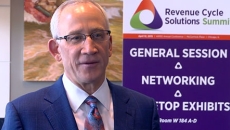ICD-10 & Coding
Ways & Means Committee members call upon CMS to make public a plan to avoid disruption of payment to providers and physicians after Oct. 1 implementation date for ICD-10.
Of the 23,138 claims filed, 20,306 were accepted, though most of the rejections were caused by issues not related to ICD-10.
But not all think organizations are ready for the change.
Smaller practices that may not have the capital to invest in systems and staff to manage the coding change may seek out mergers, joint ventures or other partnerships.
The Advisory Board revenue cycle head Ed Hock says punting on ICD-10 until the new code set is ready robs healthcare providers of the benefits of the Oct. 1 changeover.
"Instead of imposing this unfunded mandate, Congress should delink the disease classification system from reimbursement policy, and make the adoption of the new ICD-10 code system voluntary until a less burdensome billing process is in place," The Heritage Foundation wrote in a May 18 report.
Steven Stack, the incoming president of the American Medical Association, says problems with ICD-10 for physicians are too big to allow it to move forward.
Changes in payment trends brought about by the Affordable Care Act, technology expenditures related to electronic health records, and fluctuations in cash flow from higher deductibles and patient copays have all impacted the need for readily available cash.
A new bill by U.S. Rep. Diane Black wants an 18-month period where no claims can be denied due to coding errors.
Bert Zimmerli, Executive Vice President and Chief Financial Officer of Intermountain Healthcare, enthuses about wireless technology, sensors and connected health as they pertain to the growing focus on revenue cycle management in healthcare.
